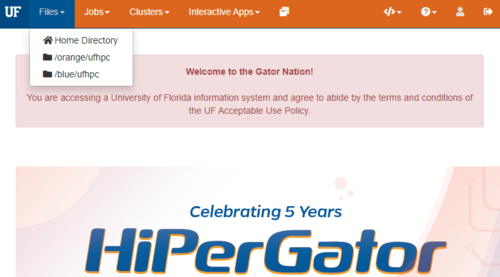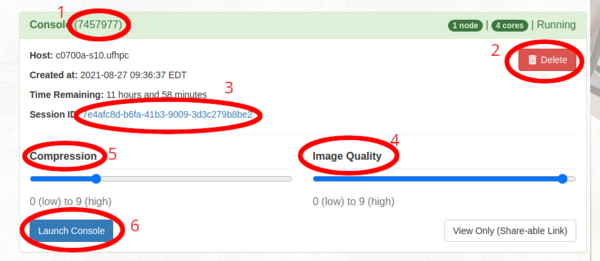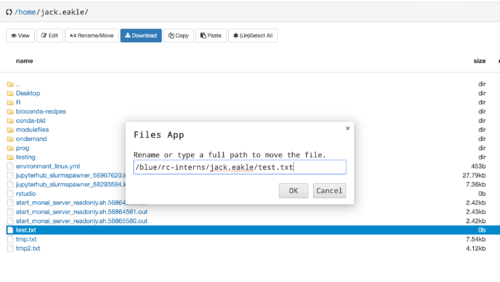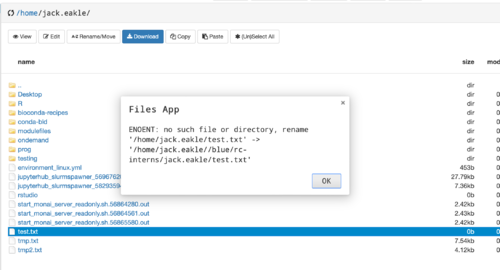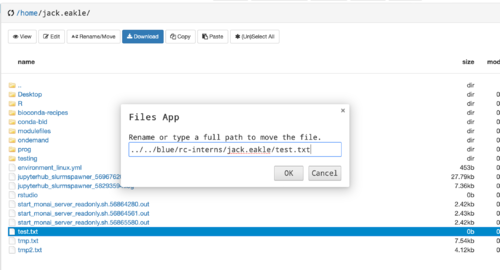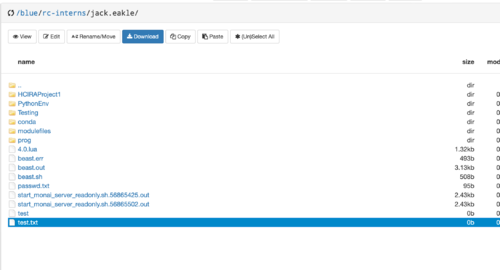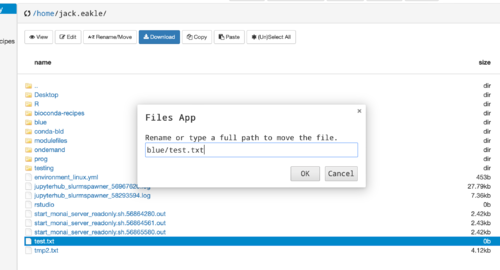Difference between revisions of "Open OnDemand"
Jack.eakle (talk | contribs) (Added documentation on the Files error when using absolute versus relative paths to move) |
|||
| Line 134: | Line 134: | ||
*** $ln -s /blue/your_group/your_username/ blue | *** $ln -s /blue/your_group/your_username/ blue | ||
[[File:OOD File Symlink.png|500px|center]] | [[File:OOD File Symlink.png|500px|center]] | ||
| + | |||
| + | == Troubleshooting == | ||
| + | |||
| + | If you encounter any issues while using Open OnDemand, try the following troubleshooting steps: | ||
| + | |||
| + | === Full Home Directory === | ||
| + | |||
| + | If you are unable to access your files or launch jobs, it may be due to your home directory being full. Check your disk usage with the command du -sh ~/* in the terminal. If you find that your home directory is full, you can try removing unnecessary files or requesting additional disk space. | ||
| + | |||
| + | === Browser Cache === | ||
| + | |||
| + | If you are experiencing issues with the Open OnDemand interface, such as buttons not working or pages not loading correctly, try clearing your browser cache. Instructions for clearing the cache can be found in the settings or options menu of your web browser. | ||
| + | |||
| + | === Proxy Errors === | ||
| + | |||
| + | If you are unable to connect to Open OnDemand, you may be experiencing issues with your network proxy settings. Try configuring your proxy settings to allow connections to the ondemand.rc.ufl.edu domain. If you are still unable to connect, please contact us for assistance. | ||
Revision as of 20:03, 18 March 2023
This page provides getting started information for using Open OnDemand to access HiPerGator. Open OnDemand is setup to provide a web interface to starting and attaching to HiPerGator jobs and it supports GUI programs, Job Status, and other interactions with HiPerGator via seamless connections through web browsers. This service is available at the following URL:
For questions or support, please open a support request with [OnDemand] in the subject.
Getting started video
Please watch our introductory video here:
Using Open on Demand on HiPerGator
![]() [5 min, 11 sec]
This video covers the use of Open on Demand https://openondemand.org/ on HiPerGator via https://ood.rc.ufl.edu/.
[5 min, 11 sec]
This video covers the use of Open on Demand https://openondemand.org/ on HiPerGator via https://ood.rc.ufl.edu/.
- Connect to https://ood.rc.ufl.edu/
- Launch a terminal
- Launch many graphical applications like Rstudio, Matlab and Freeview
- Manage job submission
- Upload, download and edit files via your browser
To Navigate the basic functions of OnDemand, first login to https://ood.rc.ufl.edu
Once you access the dashboard, you can use the top menus to navigate.
|
Files
Jobs
Clusters
|
Interactive Apps My Interactive Sessions Help Logout |
Starting an Interactive application
To start an interactive application, first select the application you would like to start from the "Interactive Applications menu". Then you will see a form with the SLURM options available for that application. Fill in the fields with the resources you would like allocated for this application session.
General Form Fields
Version: Select the application version This defines the version of the application you want to load.
We recommend leaving the following fields at the default of 1:
- Number of MPI Tasks (--ntasks)
- Number of CPU cores requested per MPI task (--cpus-per-task, -p)
- Maximum memory requested for this job in Gigabytes (--mem, -m)
- Note: If you are using advanced memory options in Additional SLURM Options below, then leave this blank.
- Time Requested for this job in hours (--time, -t)
We recommend leaving the following fields blank as default
- SLURM Account (--account, -A):
- QoS (Required if custom Account is set, --qos, -q)
- Cluster partition (--partition, -p)
- Generic Resource Request (--gres)
- Additional SLURM Options
You can have multiple copies of the same application running at the same time by submitting the form multiple times. Then select "Launch" to submit your job request.
Display Environment on the Console
You can use the "Console" Interactive application from the OOD menu to get a console session enabled with the frame-buffer. To do this:
- login to https://ood.rc.ufl.edu
- Select the "Console" Application
- Interactive Apps -> Console
- Fill in the form with your job resource request (please make sure to ask for at least 4 GB of RAM to make sure you have enough to render the frame buffers) and then select "Launch" at the bottom of the form. For specific parameters, see the Open OnDemand Access page
- Select "Launch Console" from the "My Interactive Sessions" page once your job starts.
This console session will open in your web browser and will have both the DISPLAY variable set and the X11 server started.
Connecting to an Interactive application
Once a job has started, you can connect using the "My Interactive Applications" menu.
- Select this menu and you will see a connection box for each application you have running and pending.
- Once the job starts, a Launch (App Name) icon will appear.
- Select this link to open a new browser window connecting you to your application.
Connecting to a HWGUI application
To use the hardware accelerated resources with your interactive sessions, please select the hwgui partition from the partition list when submitting your job resource form.
Additionally, many applications that require hardware acceleration by default have been added under the HWGUI Apps section of the Interactive Apps menu.
Job Connect Card
This section outlines several of the key features of the job connect card:
- JobID: This is the SLURM JobID for this job
- Delete: This will cancel a running job, (or delete the session if the job has already ended)
- OOD Session ID: This is the unique identifier for the OOD session for this job, can be clicked to bring up the OOD log directory for troubleshooting
- Image Quality: This setting controls the quality of the visual interface at the source, use a lower setting for slower internet connections
- Compression: This setting adjusts the amount of CPU based compression used for the NoVNC connection, use higher settings for slower connections but note it will increase CPU usage on both the job and client
- Launch Button: Click this button to connect to your running job in a web-browser session
Files App
The Files App allows users to view, edit, rename/move, download/upload, and create files on HPG. The session starts in the /home/user_name directory but other directories can be accessed by using the 'Go to' button and typing the absolute directory of where you want to view.
- Some users have run into issues with the 'Rename/Move' function when using absolute paths to move a file.
- The 'Rename/Move' function works relative to where you are viewing, and you are not able to use the absolute path.
- Example: Moving /home/test_user/test.txt to /blue/test_group/test_user/ :
-
- FIX: Use relative paths to move the files to different locations:
-
- Another fix is to create a symlink between your home and blue directories:
- $ln -s /blue/your_group/your_username/ blue
Troubleshooting
If you encounter any issues while using Open OnDemand, try the following troubleshooting steps:
Full Home Directory
If you are unable to access your files or launch jobs, it may be due to your home directory being full. Check your disk usage with the command du -sh ~/* in the terminal. If you find that your home directory is full, you can try removing unnecessary files or requesting additional disk space.
Browser Cache
If you are experiencing issues with the Open OnDemand interface, such as buttons not working or pages not loading correctly, try clearing your browser cache. Instructions for clearing the cache can be found in the settings or options menu of your web browser.
Proxy Errors
If you are unable to connect to Open OnDemand, you may be experiencing issues with your network proxy settings. Try configuring your proxy settings to allow connections to the ondemand.rc.ufl.edu domain. If you are still unable to connect, please contact us for assistance.
